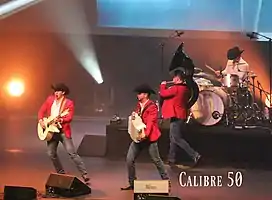Regional Mexican Airplay
Regional Mexican Airplay (also referred to as Regional Mexican Songs) is a record chart published by Billboard magazine. It was established by the magazine on October 8, 1994, with "La Niña Fresa" by Banda Zeta being the first number-one song on the chart.[1] The chart mainly focuses on musical styles originating from Mexico including Mariachi, Norteño, Banda and Duranguense as well as the Mexican American community in the United States such as Tejano. These genres are collectively referred to as "Regional Mexican" under the Latin music umbrella. This chart features only singles or tracks and like most Billboard charts, is based on airplay; the radio charts are compiled using information tracked by from Nielsen Broadcast Data Systems (BDS), which electronically monitors radio stations in more than 140 markets across the United States. The audience charts cross-reference BDS data with listener information compiled by the Arbitron ratings system to determine the approximate number of audience impressions made for plays in each daypart.[2]
Records

Artist with the most number-one hits
| Number of singles | Artist | Span | Longest-reigning number-one | Ref |
|---|---|---|---|---|
| 18 | Calibre 50 | [3] | ||
| 16 | Conjunto Primavera | "Necesito Decirte" (1999) - 21 weeks | [4] | |
| Intocable | "Sueña" (2002) - 13 weeks | [5] | ||
| 15 | Los Tigres del Norte | [6] | ||
| 14 | Banda el Recodo | "Yo Sé Que Te Acordarás" 19 weeks (2000) | [7] | |
| La Arrolladora Banda El Limón | "Llamada de Mi Ex" (2012) - 19 weeks | [8] | ||
Top 10 songs of All-Time (1994–2018)
In 2018, Billboard magazine compiled a ranking of the 20 best-performing songs on the chart since its inception in 1994. The chart is based on the most number of weeks the song spent on top of the chart. For songs with the same number of weeks at number one, they are ranked by the most weeks in the top ten, followed by most total weeks on the chart.[9]
| Rank | Single | Artist(s) | Peak year | Peak and duration | Ref. |
|---|---|---|---|---|---|
| 1. | "No Me Conoces Aun" | Palomo | 2001 | #1 for 31 weeks | [9] |
| 2. | "Necesito Decirte" | Conjunto Primavera | 1999 | #1 for 21 weeks | |
| 3. | "Llamada De Mi Ex" | La Arrolladora Banda El Limón de René Camacho | 2012 | #1 for 19 weeks | |
| 4. | "Yo Sé Que Te Acordarás" | Banda el Recodo de Cruz Lizarraga | 2000 | #1 for 19 weeks | |
| 5. | "Una Vez Más" | Conjunto Primavera | 2003 | #1 for 17 weeks | |
| 6. | "Dime Que Quieras" | Banda el Recodo de Cruz Lizarraga | 2010 | #1 for 17 weeks | |
| 7. | "No Puedo Olvidarte" | Beto y sus Canarios | 2005 | #1 for 16 weeks | |
| 8. | "El Ruido de Tus Zapatos" | La Arrolladora Banda El Limón de René Camacho | 2008 | #1 for 16 weeks | |
| 9. | "Te Presumo" | Banda el Recodo | 2009 | #1 for 14 weeks | |
| 10. | "Nomás por Tu Culpa" | Los Huracanes del Norte | 2003 | #1 for 15 weeks |
Billboard Regional Mexican Airplay number-one songs of the year
- 1995: "Tú Sólo Tú" by Selena
- 1996: "Un Millon de Rosas" by La Mafia
- 1997: "Ya Me Voy Para Siempre" by Los Temerarios
- 1998: "Por Que Te Conocí" by Los Temerarios
- 1999: "Necesito Decirte" by Conjunto Primavera
- 2000: "El Listo de tu Pelo" by Los Angeles Azules
- 2001: "Y Llegaste Tu" by Banda el Recodo
- 2002: "No Me Conoces Aun" by Palomo
- 2003: "Una Vez Mas" by Conjunto Primavera
- 2004: "Dos Locos" by Los Horóscopos de Durango
- 2005: "Hoy Como Ayer" by Conjunto Primavera
- 2006: "Aliado del Tiempo" by Mariano Barba
- 2007: "Dime Quien Es" by Los Rieleros del Norte
- 2008: "Hasta el Dia de Hoy" by Los Dareyes de la Sierra
- 2009: "Te Presumo" by Banda el Recodo
- 2010: "Ando Bien Pedo" by Banda Los Recoditos
- 2011: "Me Encantaria" by Fidel Rueda
- 2012: "Llamada De Mi Ex" by La Arrolladora Banda El Limón
- 2013: "El Ruido de Tus Zapatos" by La Arrolladora Banda El Limón
Decade-end charts
- 2000s: "No Me Conoces Aun" by Palomo[10]
See also
References
- General
- "Regional Mexican Songs chart". Billboard. Retrieved November 5, 2018..
- Specific
- "Regional Mexican Airplay: October 8, 1994". Billboard. Retrieved December 9, 2019.
- "Billboard Methodolody". Billboard. Nielsen Business Media, Inc. Archived from the original on 2008-07-31. Retrieved 2009-01-10.
- "Calibre 50 Chart History: Regional Mexican Airplay". Billboard. Retrieved September 12, 2020.
- "Conjunto Primavera Chart History: Regional Mexican Airplay". Billboard. Retrieved January 24, 2020.
- "Intocable Chart History: Regional Mexican Airplay". Billboard. Retrieved January 24, 2020.
- "Los Tigres del Norte Chart History". Billboard. Retrieved January 24, 2020.
- "Banda El Recodo De Cruz Lizárraga Chart History". Billboard. Retrieved January 24, 2020.
- "La Arrolladora Banda el Limón de René Camacho Chart History". Billboard. Retrieved January 24, 2020.
- "Billboard's Top 20 Regional Mexican Songs of All Time". Billboard. Prometheus Global Media. September 26, 2018. Archived from the original on September 27, 2018. Retrieved January 23, 2020.
- "Best of the 2000s: Regional Mexican Songs". Billboard. Archived from the original on November 11, 2010. Retrieved 22 December 2020.
External links
- Current Billboard Regional Mexican Airplay chart (subscription required)